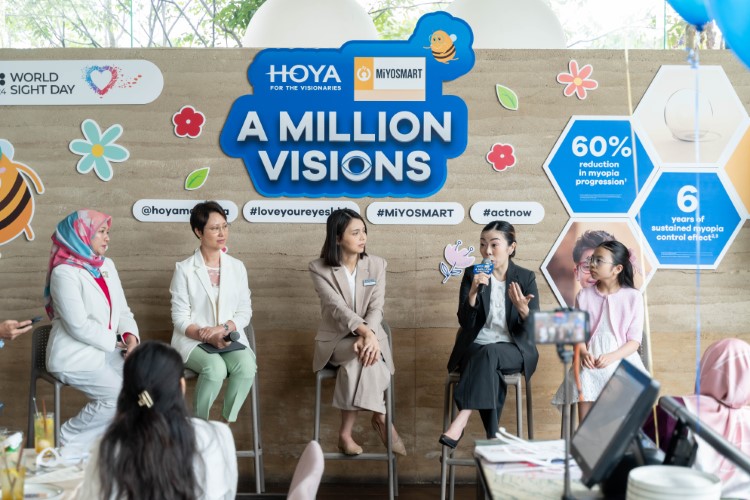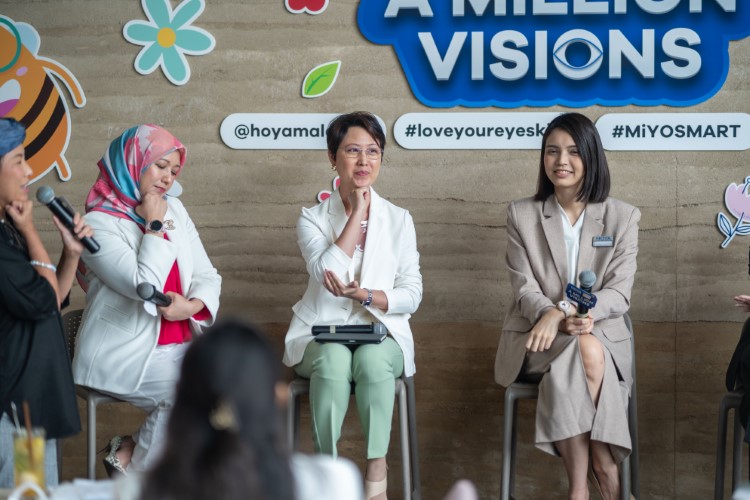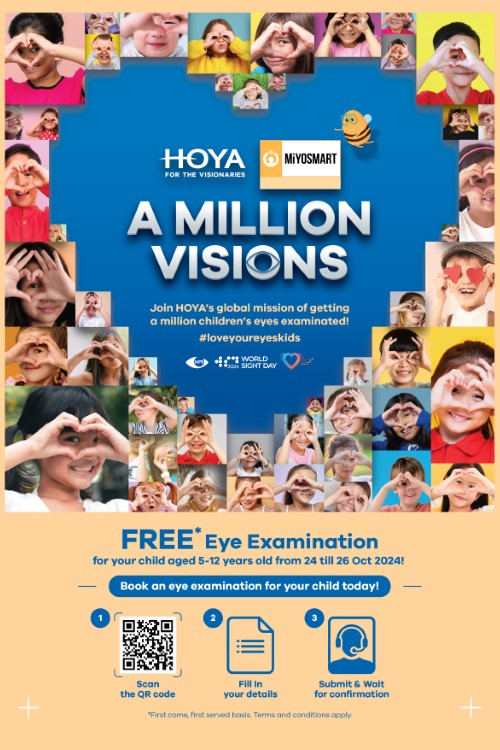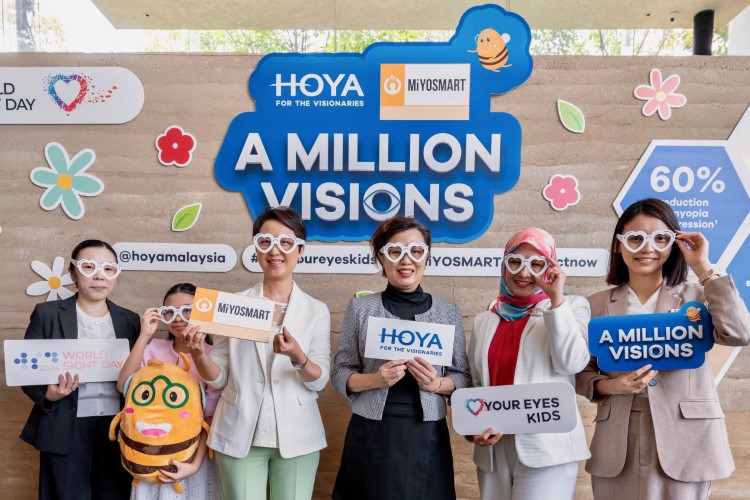Main Image Caption: Ms. Nicole Tan (Parent), Miss Avril Herng (Myopic Child), Ms. Liew Mei Lin (Optometrist), Ms Lew Chee Quin (Managing Director of Malaysian Hoya Lens), Dr. Norazah Abdul Rahman (Paediatric Ophthalmologist), Ms. Chong Ching Wei (Professional Affairs Manager of Malaysian Hoya Lens)
As World Sight Day 2024 approaches, HOYA Malaysia is shining a spotlight on children’s eye health, aligning with the global theme #loveyoureyeskids to prevent future blindness. Today, HOYA Malaysia proudly launched the “A Million Visions” campaign, supporting HOYA’s global goal of providing 1 million eye examinations to children, addressing the growing concern of myopia among them. As part of this effort, HOYA Malaysia is offering free eye examinations to children aged 5 to 12, emphasising the need for early detection and treatment. The campaign also urges eye care professionals (ECPs) to consider clinically proven early interventions, like MiYOSMART lenses to manage myopia progression in high-risk children.

The Expert Panellists, from LtoR: Dr. Norazah Abdul Rahman (Paediatric Ophthalmologist), Ms. Liew Mei Lin (Optometrist), Ms. Chong Ching Wei (Professional Affairs Manager of Malaysian Hoya Lens), Ms. Nicole Tan (Parent)
and Miss Avril Herng (Myopic Child)

Optometrist, Ms Liew Mei Lin, showing the audience the Harmon Distance for optimal visual distance for reading and other close work
Understanding Myopia and Its Global Impact
Myopia, or shortsightedness, is a refractive error that affects millions of children worldwide. According to recent studies[1], the prevalence of myopia has reached alarming rates, with projections indicating that nearly half of the global population could be myopic by 2050. High myopia is associated with an increased risk of serious eye diseases such as glaucoma, cataract, and retinal detachment. This underscores the urgency of addressing this growing public health concern.
Many parents remain unaware of the early signs of myopia in their children, often delaying eye tests. This delay is significant as children, who may have lived with myopia for years, often consider their impaired vision as normal and do not complain about it. Regular eye tests from the age of 5 to 12 are crucial to detect and manage myopia early.
Common Misconceptions About Myopia
There are several misconceptions surrounding myopia that need addressing. One of the most common is the belief that wearing glasses will make myopia worse or lead to dependence on them- this is false. In reality, untreated myopia can lead to its progression, increasing the risk of severe vision problems later in life, including conditions that could result in blindness.
“Myopia itself doesn’t cause blindness directly, but it significantly increases the risk of developing serious eye conditions that can lead to vision loss. Early detection and intervention are key to preventing these outcomes,” said Dr Norazah Abdul Rahman, a leading Ophthalmologist in Kuala Lumpur.
Taking Action: What Parents Need to Know
Parents are encouraged to take proactive steps to protect their children’s vision:
- Spend More Time Outdoors: Most Eye Care Professionals recommend at least 2 hours a day outdoors to reduce the risk of myopia onset and its progression.[2]
- Seek Regular Eye Checks: Ensure children have regular eye examinations to detect and treat myopia or other vision issues early. Be mindful that children may hide or do not recognise vision problems.
- Give Eyes a Break: Encourage children to follow the 20-20-20 rule—every 20 minutes, look at something at least 20 feet away for at least 20 seconds to reduce eye strain from screen time and near work.
Should myopia be detected, research has found innovative technologies like the Defocus Incorporated Multiple Segments (D.I.M.S) lens, found in HOYA’s MiYOSMART, effectively reduced the progression of myopia by up to 60%[3]. D.I.M.S. is a lens technology that creates multiple defocus zones on the lens surface, helping to slow the progression of myopia by controlling eye growth while still providing clear central vision. These advancements can slow down the progression of myopia, offering children better visual health and reducing the risk of future complications.
HOYA Malaysia’s Commitment to Eye Health

A Million Visions Poster

DIMS Lens
In conjunction with World Sight Day 2024, HOYA Malaysia has launched this campaign to raise awareness about children’s eye health. The campaign will offer free eye examinations and lifestyle consultations for children aged 5 to 12. Parents can book an appointment at one of the 400+ participating optical stores nationwide between 24 – 26 October 2024 through HOYA’s link : https://tinyurl.com/wsdhoya The registration will start on 7 October 2024 and close on 22nd October 2024 or once all slots are filled. First come, first served basis. Terms & conditions apply.
“We are committed to empowering parents with the knowledge and solutions to protect their children’s vision. Early intervention can make all the difference in preventing the progression of myopia and securing a brighter future for our young generation,” said Ms. Lew Chee Quin, Managing Director at Malaysian Hoya Lens Sdn. Bhd.
[1] Holden BA, Fricke TR, Wilson DA, Jong M, Naidoo KS, Sankaridurg P, Wong TY, Naduvilath TJ, Resnikoff S, Global Prevalence of Myopia and High Myopia and Temporal Trends from 2000 through 2050, Ophthalmology, May 2016 Volume 123, Issue 5, Pages 1036–1042.
[2] Shah RL, et al. Time outdoors at specific ages during early childhood and risk of incident myopia. Invest Ophthalmol Vis Sci (2017).
[3] Lam CSY, Tang WC, Tse DY, Lee RPK, Chun RKM, Hasegawa K, Qi H, Hatanaka T, To CH. Defocus Incorporated Multiple Segments (DIMS) spectacle lenses slow myopia progression: a 2-year randomised clinical trial. Br J Ophthalmol. 2020 Mar;104(3):363-368.
















